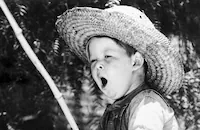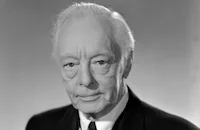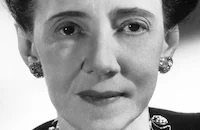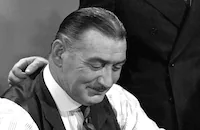The Story of Alexander Graham Bell

Brief Synopsis
Cast & Crew
Irving Cummings
Don Ameche
Loretta Young
Henry Fonda
Charles Coburn
Gene Lockhart
Film Details
Technical Specs

Synopsis
In 1873, young Alexander Graham Bell, a teacher of deaf mutes, experiments with a way to visualize sound so that his pupils will be able to speak. Alec's project leads him to work on the development of a telegraph, and consequently, Thomas Sanders, the father of one of his pupils, introduces the young inventor to businessman Gardner Hubbard, hoping that Hubbard will offer his financial support. Alec falls in love with Hubbard's deaf daughter Mabel, but is unable to propose for lack of funds. However, Mabel supports Alec's endeavors, and when he threatens to give up his new invention, the telephone, to find a wage paying job, Mabel insists that he continue with his experiments. Together with his assistant, Thomas Watson, Alec toils in the face of hunger and adversity until miraculously, his invention "speaks." Alec's New England Bell Company is reluctantly backed by Sanders and Hubbard, and after Alec and Mabel are married, they voyage to England to demonstrate the invention to Queen Victoria. When the queen agrees to install the device in Buckingham Palace, Alec's financial worries appear to be over until he receives word that a company backed by Western Union is challenging his patent. Alec and Mabel immediately return to America to bring suit against the company for patent infringement. During a dramatic court trial, Mabel produces evidence that proves that her husband developed the phone first, thus winning Alec a stunning victory as Western Union cedes defeat and offers to go into partnership with Bell.

Director
Irving Cummings
Cast

Don Ameche

Loretta Young

Henry Fonda

Charles Coburn

Gene Lockhart

Spring Byington
Sally Blane
Polly Ann Young
Georgiana Young

Bobs Watson

Russell Hicks
Paul Stanton

Jonathan Hale

Harry Davenport
Beryl Mercer

Elizabeth Patterson
Charles Trowbridge
Jan Duggan
Claire Du Brey
Harry Tyler
Ralph Remley
Zeffie Tilbury
Lillian West
Ruth Robinson
Ottola Nesmith
Warren Jackson
Tyler Brooke
George Guhl
Mary Field
Nora Cecil
Dave Morris
Esther Brodelet

Fern Emmett

Jack Kelly

Edward Keane
Edmund Elton
John Elliott
Edward Le Saint
Frank Jaquet
Dick Elliott
Jack Walsh
Charles Tannen
Davison Clark
Otto Hoffman
Landers Stevens
John Spacey
Craufurd Kent
Eddy Waller
Jerold Clifford Lyons
William Wagner
Crew
Richard Day
Ray Harris
Roger Heman
Boris Ingster
Arthur Von Kirbach
Mark-lee Kirk
Thomas Little
Kenneth Macgowan
Royer
Ad Schaumer
Leon Shamroy
Louis Silvers
Milton Sperling
Walter Thompson
Lamar Trotti
Darryl F. Zanuck

Videos
Movie Clip



Film Details
Technical Specs

Articles
The Story of Alexander Graham Bell
Second-billed Loretta Young plays Bell's love interest and eventual wife, a deaf woman who inspires Bell in his work. One likely apocryphal story that has grown up around this production is that Bell's wife was also mute, and the studio's refusal to let Young play the part that way angered her enough to go freelance instead of renewing her contract. In fact, Mabel Hubbard Bell had learned to lip-read and speak in several languages, even testifying before the Massachusetts legislature at the age of 9. Young may have been told Mrs. Bell was mute and may well have been angry enough with her studio to quit, but the highly intelligent and accomplished woman she played was not the real cause. And Mabel Bell was also not the inspiration for "Ma Bell," the slang term by which the national telephone company was once known.
Speaking of slang terms, the picture's star made enough of an impression in this popular film that for a time, the telephone device itself became known as the "Ameche." In the Marx Brothers movie Go West (1940), Groucho points out that the setting of the story is 1870 and that Ameche hasn't invented the telephone yet. In Ball of Fire (1941), Barbara Stanwyck, schooling Gary Cooper and his colleagues in contemporary slang, explains that the phone is known as the Ameche because the actor "invented it in the movies." Luckily the term didn't stick or we'd now be referring to the iAmeche and, worse for the actor's legacy, bad performers would be accused of "amecheing it in."
The sisters of Loretta Young's character are played by the actress's real sisters, Sally Blane, Polly Ann Young, and Georgiana Young. This was the only time all four appeared in a movie together.
Bell's daughter, Mrs. Gilbert Grosvenor, had official approval over the script, which during pre-production was titled "American Miracle" and simply "Alexander Graham Bell."
In story conferences, Twentieth Century-Fox studio head Darryl Zanuck slammed the script for putting too much focus on science at the expense of the story's romantic angle. He also suggested Eddie Albert for the part of Watson, Nancy Kelly for Mrs. Bell, and Edna Mae Oliver as Mrs. McGregor.
There's no record of whether Zanuck also wanted the studio's main male star, Tyrone Power, for the lead, but New York Times critic Frank S. Nugent got in hot water applauding the studio's decision not to put the actor in the role. In his review, Nugent wrote, "If only because it has omitted Tyrone Power, the 20th-Fox production of The Story of Alexander Graham Bell, at the Roxy, must be considered one of that company's more sober and meritorious contributions to the historical drama." The remark reportedly cost the paper some $50,000 in studio advertising. Nugent had long been critical of Fox's output, but following his glowing review of its John Ford film The Grapes of Wrath (1940), the studio hired him as a script consultant. Nugent became a favorite of Ford, writing 11 of the director's films, including The Quiet Man (1952), for which he was Oscar nominated.
The Story of Alexander Graham Bell was written by Lamar Trotti, another Ford collaborator. Trotti wrote four screenplays for the director, including Henry Fonda's next two pictures after this, Young Mr. Lincoln (1939) and Drums Along the Mohawk (1939). Trotti had a way with historical biographies, turning out scripts for Brigham Young (1940), Belle Starr (1941), the biopic of singer Jane Froman With a Song in My Heart (1952), and Wilson (1944), his Oscar-winning bio of Woodrow Wilson.
Appropriately enough, the film had its premiere at the 1939 World's Fair in New York, where advances in technology and industry were touted.
Ameche reprised his role in a 60-minute Lux Radio Theater adaptation broadcast May 14, 1945. His younger brother, Jim Ameche, played the part in his only feature film role in The Story of Mankind (1957), an all-star production featuring the Marx Brothers, Hedy Lamarr, Vincent Price, and Ronald Colman.
Director: Irving Cummings
Producer: Darryl F. Zanuck
Screenplay: Lamar Trotti, story by Ray Harris
Cinematography: Leon Shamroy
Editing: Walter Thompson
Art Direction: Richard Day, Mark-Lee Kirk
Music: Ernst Toch (uncredited)
Cast: Don Ameche (Alexander Graham Bell), Loretta Young (Mabel Hubbard Bell), Henry Fonda (Thomas Watson), Charles Coburn (Charles Hubbard), Gene Lockhart (Thomas Sanders)
By Rob Nixon

The Story of Alexander Graham Bell
Quotes
Mr. Watson, come here, I want you!- Alexander Graham Bell
Mr. Watson, please eat something. You must have the appetite of a bird.- Mrs. Hubbard
Yes, Ma'am, a vulture.- Mr. Watson
Trivia
Notes
The working titles of this film were American Miracle and Alexander Graham Bell. It was also reviewed as Story of Alexander Graham Bell. News items in H note that the film was budgeted at $1,500,000. Bell's daughter, Mrs. Gilbert Grosvenor, had official approval over the script. According to materials contained in the Twentieth Centuury-Fox Produced Script Collection at the UCLA Theater Arts Library, Darryl Zanuck criticized early treatments of this film as containing too much science and not enough romance. In story conferences, Zanuck suggested Eddie Albert for the role of "Thomas Watson," Nancy Kelly for "Mrs. Bell" and Edna Mae Oliver for "Mrs. Mac Gregor." Polly Ann Young, Georgiana Young and Sally Blane, who play Loretta Young's sisters in the film, were her sisters in real life. Don Ameche became so identified with the role of Alexander Graham Bell that in Canada the slang for telephone became "the Ameche" and in the 1941 film Ball of Fire, the character played by Barbara Stanwyck calls the phone the Ameche because "he invented it." The picture was previewed at the San Francisco World's Fair on 29 March 1939.
According to the Variety obituary for New York Times film critic and later screenwriter Frank S. Nugent, a comment in Nugent's review of this film reportedly cost the newspaper some $50,000 in advertising. Nugent, who in the past had been critical of a number of the studio's productions, began his review for this film with the remark, "If only because it has omitted Tyrone Power, the 20th-Fox production of The Story of Alexander Graham Bell, at the Roxy, must be considered one of that company's more sober and meritorious contributions to the historical drama." After the matter was settled, according to Variety, New York Times publisher Arthur Hays Sulzberger sent Nugent a memo concerning the situation. Following Nugent's glowing review of The Grapes of Wrath in 1940, Twentieth Century-Fox hired him as a script critic, and he later became one of Hollywood's top screenwriters.














